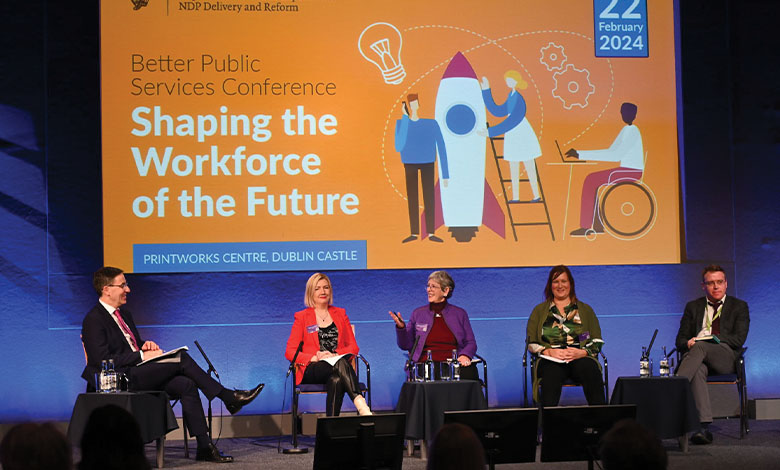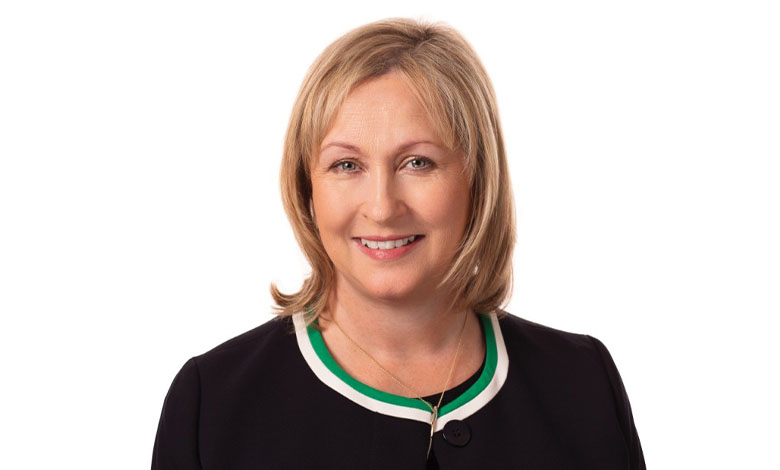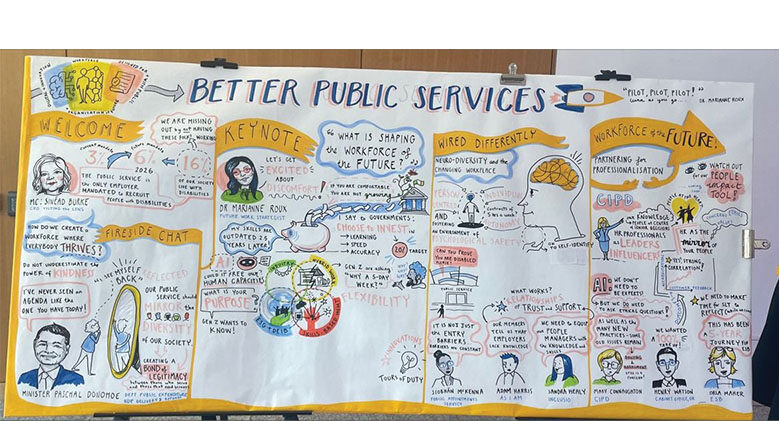Shaping the public service workforce of the future

Better Public Services, the new transformation strategy for the public service seeks to establish a public service workforce that is better equipped to meet the current and future needs of people in Ireland, writes Shirley Comerford, Assistant Secretary, Public Service Workforce Division, Department of Public Expenditure, NDP Delivery and Reform.
 The Better Public Services (BPS) public service transformation strategy to 2030 provides the direction for strategic reform in the public service with a vision for inclusive, high-quality, and integrated public service provision that meets the needs and improves the lives of the people of Ireland. The strategy recognises the crucial role that people play in driving workplace innovation, change and organisational success in an increasingly dynamic world of work.
The Better Public Services (BPS) public service transformation strategy to 2030 provides the direction for strategic reform in the public service with a vision for inclusive, high-quality, and integrated public service provision that meets the needs and improves the lives of the people of Ireland. The strategy recognises the crucial role that people play in driving workplace innovation, change and organisational success in an increasingly dynamic world of work.
The Workforce and Organisation of the Future pillar of the strategy commits to developing a more diverse, agile, and inclusive workforce that is skilled for the future and positions the public service as an employer of choice for employees seeking interesting and rewarding careers.
The strategy sets out three key actions that public service organisations are asked to prioritise as part of their people strategies to realise this ambition:
- improve equality, diversity and inclusion to create workplace cultures where every individual can thrive;
- upskill and reskill staff to meet current and future needs; and
- develop and implement progressive HR policies to position the public sector as an employer of choice.
Conference
In February 2024, the Department of Public Expenditure, NDP Delivery and Reform hosted a Better Public Services: Shaping the Workforce of the Future conference in Dublin Castle which was attended by over 400 public servants across the sector. This event represented a culmination of all of the great work which is taking place under the Workforce and Organisation of the Future pillar of the BPS 2030 strategy.
Key themes which were highlighted at the conference included developing people practices and strengthening the HR profession, tackling inequality and work in society, neurodiversity in the workplace, integrating the Irish language into workplaces, the Public Service Apprenticeship Plan and navigating the landscape of future skills.
The MC for the day was the brilliant Sinéad Burke, CEO of Tilting the Lens. Founded in 2020, Tilting the Lens is a consultancy service which advises major global brands and organisations on creating more accessible practices, policies, products, and services.
Burke and the team at Tilting the Lens have been working closely with DPENDR and Public Jobs to review disability inclusion policies across the sector, an initiative funded through DPENDR’s Innovation Fund. This collaboration will create a blueprint for the provision of reasonable accommodation at the recruitment and on-boarding stages of entry to the civil service.
The overarching theme which ran through all sessions throughout the conference was that of inclusion. As Minister Paschal Donohoe TD noted in his opening speech: “In shaping the workforce of tomorrow, we must ensure that no one is left behind, that every individual has the opportunity to contribute their unique talents and perspectives and by harnessing those contributions, we will be able to provide world class services to the people of this country.”
Marianne Roux of Roux Consulting gave the well-received keynote speech on ‘What is shaping the Future of Work?’ This thought-provoking speech framed the current landscape of work in terms of how much change and innovation has occurred in recent years and went on to show how the nature of work may change, but it will be the people working in organisations that will ultimately make a difference in providing excellent public services.
Roux touched on AI and automation, hybrid working, skills-based approaches and shifting workforce demographics and presented some case studies from public service employers in Canada, the US, and Latvia.

Flagship initiatives
Creating a workforce that is skilled for the future is vital to the success of any sector and this is something which forms a central component of the Better Public Services strategy. Three flagship initiatives of the strategy designed to upskill and reskill existing staff, as well as attract and develop new talent, are:
- the Public Service Apprenticeship Plan;
- the establishment of a centre for excellence in learning and development for the public service with the Institute of Public Administration (IPA); and
- investing in the professionalisation of HR across the sector.
Public Service Apprenticeship Plan
The Public Service Apprenticeship Plan was launched in August 2023 and sets a target of 750 registered apprentices across the public service in 2025. In addition to traditional craft apprenticeships (e.g. carpentry and plumbing), there are now apprenticeships on offer in areas such as ICT, accounting, engineering, and recruitment with more on the way in areas such as social work, digital media, planning and business management.
Expanding and modernising apprenticeship programmes within the public service creates additional pathways to entry for individuals from all backgrounds. In addition, it fosters a culture of lifelong learning and skills development for existing public servants who can re-skill through apprenticeship programmes.
Centre of excellence for learning and development
Another key initiative of the Better Public Services strategy has been the establishment of a centre of excellence for learning and development for the public service in the Institute of Public Administration (IPA), which saw the transfer of the civil service Senior Public Service (SPS) and OneLearning to the IPA. This will enable a shared, central, and strategic approach to building capability and capacity within the public service, while also making learning and development scalable across the public sector.
The integration will optimise synergies, reduce duplication, and will provide better value for money. This expansion of learning and development offerings in a strategic and scalable manner places our public service at the forefront of best practice for international public service learning and development provision.
Investing in human resources (HR)
Fulfilling the objectives of the Workforce and Organisation of the Future pillar would not be possible without professional and dedicated HR units. Another key initiative of the pillar has therefore been to ensure that civil service HR professionals are supported and developed themselves in order to drive the future workforce forward. The civil service has partnered with the Chartered Institute of Personnel and Development (CIPD) to develop people practices and strengthen the HR profession in the sector.
Inclusion and diversity
Inclusion and diversity run through all aspects of our approach to shaping the public service workforce of the future. It is essential that that the public service fosters a workforce that has a diverse range of perspectives and a diverse range of skills. To do this, it is essential that the workforce is reflective of the people who use its services and where all talents and perspectives are sought out and included.
Several recent initiatives have been progressed under the Organisation and Workforce of the Future pillar which support the objective of improving equality, diversity, and inclusion (EDI) in the future public service.
The eligibility criteria for entry to the civil service has been expanded to include all categories of Stamp 4 visa holders, which includes some 325,000 people.
Supported by the public service innovation fund, the Public Appointments Service, in collaboration with Tilting the Lens, developed a blueprint for enhancing the experience for people with disabilities at the assignment and onboarding stage to roles within the public service.
A number of progressive HR policies have recently been developed for the civil service which can be scaled across the broader public service, including the Menopause in the Workplace Framework and the Civil Service Domestic Violence and Abuse Policy.
In addition, work is well advanced on a Blended Working Framework Evaluation Model, as well as proactive implementation of legislative changes around remote and flexible working, including the Work Life Balance and Miscellaneous Provisions Act, 2023.
The public service needs to reflect the population it serves. Our sector’s people strategies, policies and practices will enable us to cultivate a more diverse, inclusive and agile workforce who possess the skills needed to provide first class public services.





